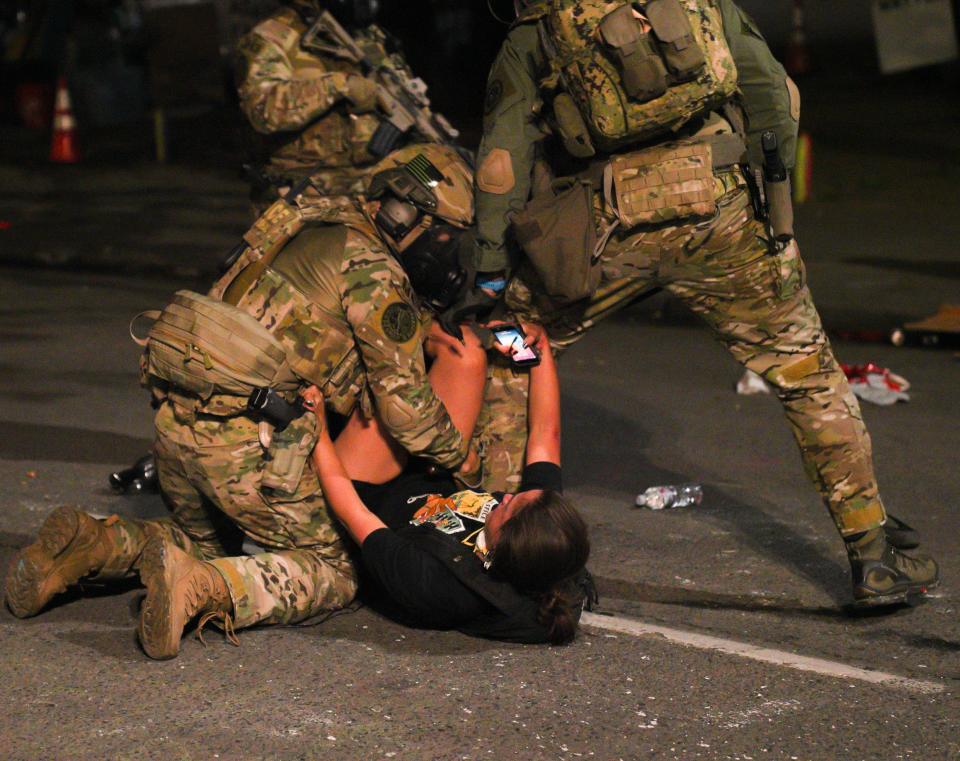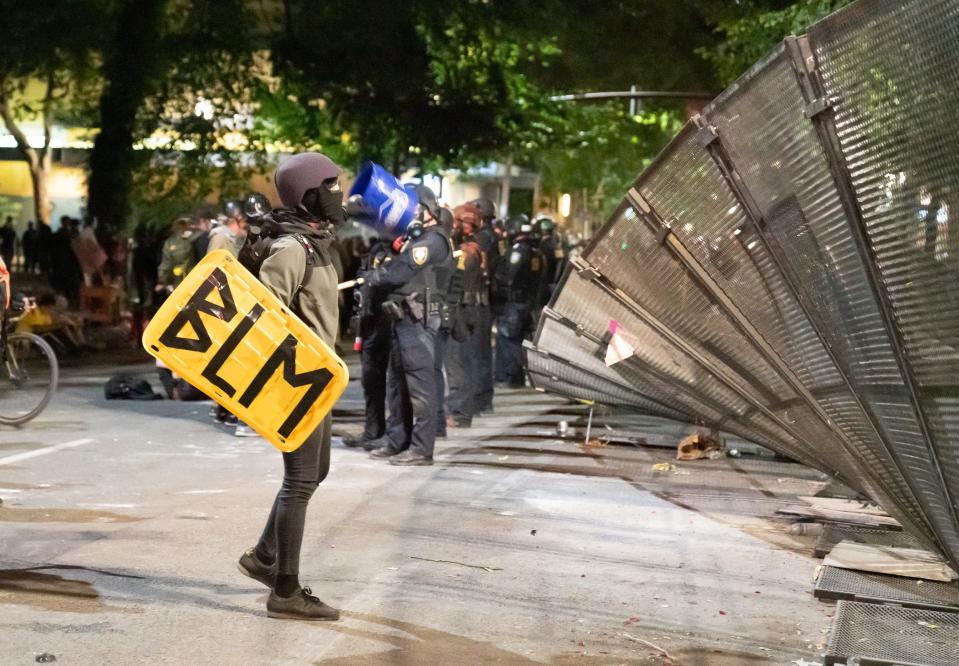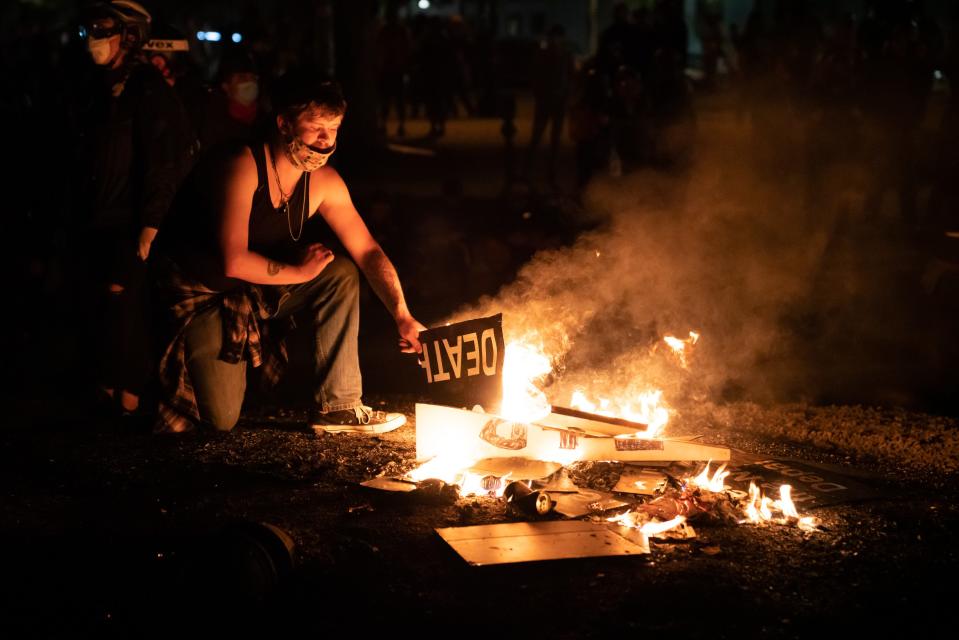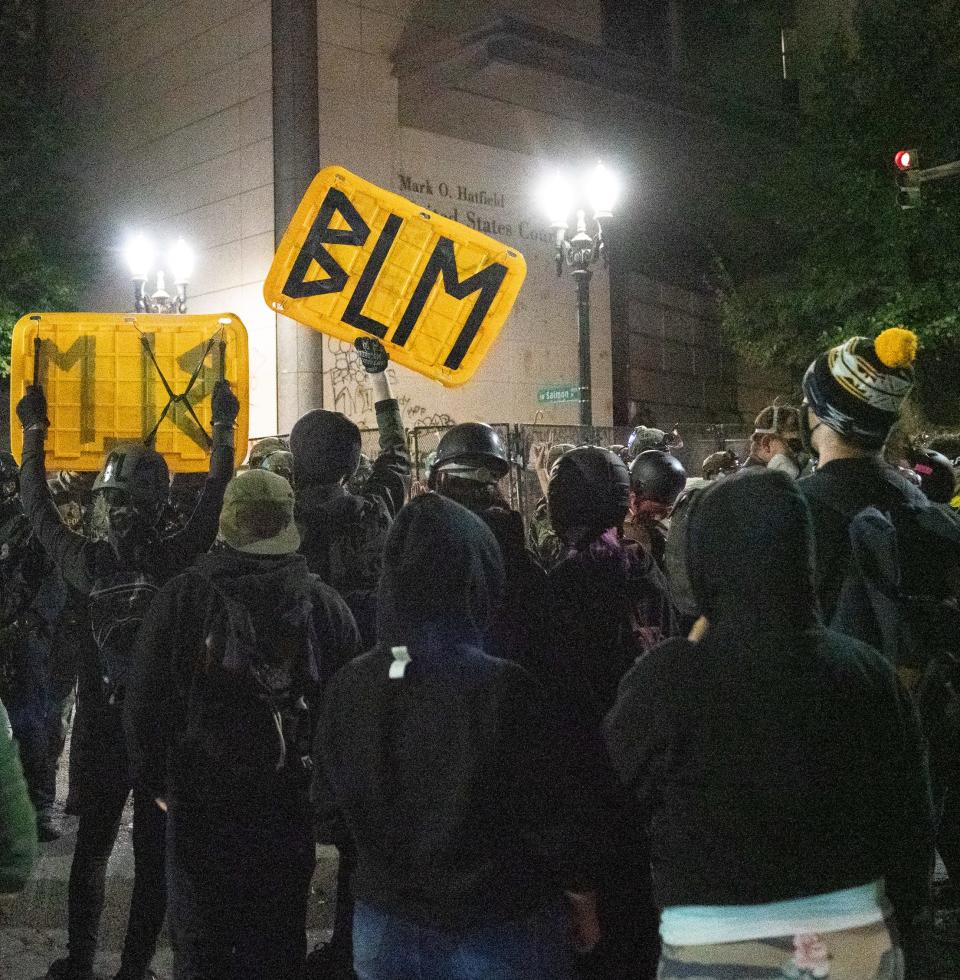Americans worried about Election Day violence and chaos are buying guns and toilet paper
AURORA, Colo. — Tabitha Converse is quietly preparing for Election Day and the weeks beyond by stocking her basement pantry with canned goods, toilet paper and other basic supplies. She even persuaded her husband to buy a hunting rifle, just in case.
Like millions of Americans, Converse, 43, fears the potential for violence that experts say may accompany this year's presidential election. A mother of two who works as a dental hygienist, Converse is trying not to worry too much, but with a pandemic, civil rights protests and raging wildfires piled atop the election's boiling-hot rhetoric, well, who knows what might happen?
Most experts predict scattered violence is the worst the United States could experience this Election Day, given isolated incidents that have already taken place this year. But across the country, Americans like Converse are stocking up and preparing to hunker down to ride out a possible wave of sustained election-related chaos. They are buying guns and ammunition in record numbers and getting ready to peel off political bumper stickers and yank out yard signs to make themselves less of a target in case the other guy wins. Some are fleeing for remote areas or custom-built bunkers.
"It just seemed, well, stupid isn't the right word, but it doesn't make sense to be that ill-prepared," says Converse, a lifelong Republican who voted Democrat in the presidential race for the first time this year. "A civil war? That could last for years. We don't have years' worth of supplies and if it went on for years, well, you could always go out and shoot a deer."
The angst follows months of widespread Black Lives Matter social justice protests, more than 90% of which were peaceful, according to a study by Amnesty International. But some conservative news outlets and GOP leaders, including President Donald Trump, have pointed to looting and destruction to argue that more federal law enforcement is needed to guard against violence, aiming their message squarely at suburban women.

On the other side, there's fear that right-wing anti-government extremists responding to the largest civil rights movement in 50 years have now aligned themselves with Trump. After years of growing hate crimes and violence, experts said there is a concern that armed right-wing terrorists might take to the streets if there are delays in election results or an unfavorable outcome, such as Democrat Joe Biden taking the White House.
"Everyone I know is concerned both about voter intimidation at the polls and potential violence as we get results from the election, and sort of what that might look like, not just around the election, but between the election and the inauguration," says Carolyn Gallaher, a professor at American University's School of International Service in Washington, D.C., and an expert on extremist violence in the United States.
While the U.S. has a long history of violent protest, from firebombings and shootings at abortion clinics by anti-abortion extremists to the 25 bombings committed by left-wing Weather Underground terror group opposing the Vietnam War and racism, experts say widespread predictions of election-related violence are unprecedented.
Further fueling potential violence: The staggering number of guns bought this year. According to FBI statistics, gun dealers in June ran more than 3.9 million background checks on purchasers through the National Instant Criminal Background Check System — the highest number ever recorded in a single month.
While background checks are not an exact measure of gun sales, they're a widely used proxy. Gun sellers in the first nine months of 2020 have conducted more checks than they did in all 2019, which held the previous record for a year at 28.3 million.
"The violence will occur either way," says Gallaher. "If Biden wins, it will be an excuse to try to delegitimize the results and to go after perceived enemies on the left, and of course, that means labeling pretty much anyone that you disagree with Antifa. But I worry, too, if Trump wins, this will be a signal to these far-right groups that have supported him, extremist groups like the Oath Keepers, Proud Boys, other groups like this, that they will see this is like open season to go after people that have been opponents of Trump. So even if he wins that, you know, I think the violence is going to happen. It's going to be sort of opening the door."
This summer, human rights group Amnesty International documented about 200 violent conflicts between protest groups out of approximately 12,000 protests nationally. Of those, most violence occurred when armed right-wing groups showed up to confront otherwise peaceful protesters, Amnesty said.
On Friday, the Justice Department announced the arrest of a Texas man, Ivan Hunter, who officials said fired 13 shots from an AK-47 type rifle into a Minneapolis police station overrun and set on fire by Black Lives Matter protesters the night of May 28. The protests erupted following the Memorial Day death of George Floyd, a Black man who died after a white police officer kneeled on his neck for nearly nine minutes. Federal officials say Hunter, 26, is a member of the "Boogaloo Bois," a loosely organized anti-government group that includes members who want to start a race war.
As BLM protests spread, Trump at one point called in black-clad federal troops over the wishes of Democratic leaders in Portland, Oregon, sparking fears among liberals and conservatives over excessive use of force.
Many liberal groups also saw Trump's decision to tear-gas protesters and then stage a photo-op with a Bible at a Washington, D.C., church this summer as further evidence that he'd be quick to deploy government troops post-election.
Trump has repeatedly said several cities with Democratic mayors are going "to hell" and he's warned that more cities will descend into chaos if Biden wins the presidency. The president has also raised concerns about the election process by claiming without evidence that voting is rigged and suggesting he won't accept the result if he loses, alarming analysts and experts.
"We're looking at one of the most profound civil rights movements this country has seen in 50 years and the president of the United States is conflating the Black Lives Movement with politically motivated violence," says Brian Griffey, an Amnesty International regional researcher and adviser who has worked in Ukraine, Nepal and Kosovo. "Trump himself called Portland worse than Afghanistan. The level of which they've been trying to throw fuel on the fire and exacerbate conflicts is incredibly concerning."

On the ground, voting rights advocates have stepped up their efforts to make sure voters can safely cast their ballots. The NAACP has trained thousands of volunteers in de-escalation tactics, hoping to prevent violence before it even starts. That's the approach also being taken by the Rev. Carl Day, a Philadelphia pastor who has encouraged groups of young Black men to stand at the polls to deter violence, whether that's local gang members looking for trouble or white domestic terrorists focused on this important swing state. Day says his particular focus is uniting the Black community against outside agitators regardless of personal politics.
"When the president of the United States seems like he's inciting a demographic of people to be on standby and he's saying he might not leave office, it brings legitimate fears to people," Day says. "It's in a lot of conversations in a lot of rooms I'm in."
Black voters have long faced election violence even before they cast a ballot. To stave off potential attacks this year, the NAACP is working with local law enforcement to improve relationships.
Stephanie Owens, the NAACP's national grassroots election protection project manager, says the challenges of COVID-19 and the racial protests following Floyd's death have heightened the organization's normal concerns about violence. In some cases, the NAACP has been talking to voters about removing their yard signs and bumper stickers to avoid post-election violence.
"The symbolism of who you're supporting is a very large component of our election tradition. But there is almost nothing traditional about this election," says Owens. "People are already being targeted based on the candidates they are supporting."

Things have long moved past political rivalries and now many Americans see this election as a battle for the heart and soul of the country, says Jose De Bastos, a security analyst with WorldAware, a risk management company. De Bastos predicts any violence that materializes will likely be centered around government institutions, like city halls and courthouses, because people often attack symbols of power. He says early reports of violence or averted violence, like the Michigan governor's apparent near-abduction by right-wing terrorists, are rightfully scaring people.
All summer, Americans have been bombarded with images of armored, anonymous riot police clashing with protesters, piling out of armored vehicles with batons and tear gar launchers, and dragging detainees into custody.
"There's an increasing feeling that the other side is my enemy, not my rival," De Bastos said. "People see those images and worry that will happen in their neighborhood."
While many people are making plans to hunker down in their homes, others are fleeing. Many super-wealthy people from New York, Chicago and Miami have snapped up property in remote areas of Montana or Wyoming or in Aspen, Colorado, long known as a haven for the rich. While many of those moves by wealthy people who can work remotely were planned before the election, the potential for violence has sharpened concerns.
"This is an escapist place, for sure. It's a place where, if you can afford to be here, it gives you an ability to check out of the world," says Aspen-based real estate agent Josh Landis.

Sales in the Aspen area have already topped $2 billion for the year. Landis says New York City has lost a lot of its luster for rich Americans, who no longer can eat out or go to Broadway shows, and, with the population density, some are deciding it would be both better and safer to put it all behind them, at least temporarily.
Other escapists have a more grim view of the potential problems following the election, which could include massive coronavirus outbreaks as fall deepens. While few predict a widespread breakdown of society, a small number of survivalists have joined a collective of "hardened" lodges scattered around the country known as Fortitude Ranch.
Members are allowed to come in advance, says CEO Drew Miller, a retired U.S. Air Force colonel, who predicts as many as 25% of his approximately 400 members will be staying at the three sites on Election Day. Miller expects scattered violence around the country — "emotional, irrational violence and opportunistic looting by bad people" — rather than any sort of organized violence.
"Hopefully, it will be limited and controlled, but it could, unfortunately, devolve into long term, widespread clashes; some even fear civil war," he says.
Converse, the woman who lives in suburban Denver, says the fear of election violence adds to her overall concern about the state of the country. She says she's seen little hope for optimism given the political divides, and vividly remembers the panic that set in at the beginning of the pandemic as Americans discovered they couldn't buy toilet paper.
"I do want to remind people: 'Hey, in March, we didn't know we'd be out of toilet paper,'" she says. "There's a general fear that there's something happening or could be happening that we might not be prepared for. And I want to be prepared."
This article originally appeared on USA TODAY: Election Day fears prompt Americans to buy guns, toilet paper


